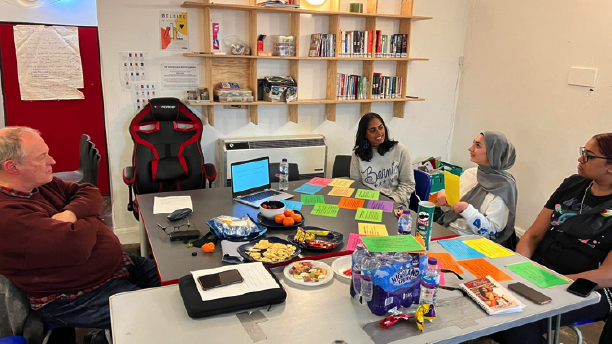JtoJ’s workshop with Take Back The Power at the Winch

On Thursday 10th March 2022, Tania and Martin from Journey to Justice delivered a workshop on economic (in)justice in the UK at the Winch (https://thewinch.org/), a youth charity based in Camden.
The young people, Jannah and Nadia, and their youth worker, Progress, with whom we worked are part of a youth social action group at the Winch known as Take Back The Power (TBTP). The young people of Bengali heritage are staunch activists ready to make a positive and informed difference in their local community. With their historical knowledge, lived experiences of injustice and drive to bring about a better world they had already planned their own action around knowing your rights when stopped and searched by the police.
Journey to Justice tapped into their momentum to galvanise and challenge the young people at TBTP to expand their thinking, activism and understanding around issues of inequalities in the UK.
As a group, we firstly discussed the connections between racism and policing; a theme they were already familiar with. By telling the story of the Newham 8 Martin used a barometer exercise to frame the debates emerging from this British story in the 1980s and the options given on what to do when stopped & searched by the police by Dr Adam Elliott-Cooper around the usage of self-defence, knowing your rights and the accountability of your actions in hindsight.
‘Remember Self-defence is knowing your own rights, when you encounter situation where the police is being unjust, challenge them with your knowledge as KNOWLEDGE IS POWER.’ – Jannah, young activist at Take Back The Power.
We then moved on to talk about questions of identity, heritage and migration whilst looking at two videos on the connections between the past and present using the historical understanding of the British Empire relayed by Professor Gurminder Bhambra and the challenges young people face in the workplace and in today’s labour market by Doctor Charlotte Macpherson. The team also looked at gentrification and housing using the successful housing campaign carried out by Costa Christou and his peers at the Advocacy Academy. Reflections emerged on whether those external forces which are pushing people primarily on low-income out of their communities were designed on purpose or not.
Finally, Tania carried out an activity looking at tactics rendering a social campaign successful. Jannah, Nadia and Progress each chose a few tactics cards which they felt were crucial to succeed in any campaign’s goals. As a group, we all agree that having fun, using social media, harnessing collective power and persevering mirrored the young people’s identity, vibes and personalities as activists.
Journey to Justice’s team is ever so grateful to the Winch and to youth social action workers, Annick and Progress for welcoming us so warmly. We certainly all left feeling galvanised, grateful and hopeful.




